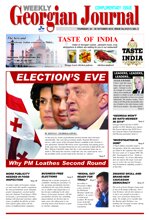Georgia now has a new President which is good. Or is it? Our democratically organized state has followed a couple of existing western examples to build its democratic statehood. We have not based it on only European or only on American political paradigms. Our constitution has borrowed bits from here and bits from there, and finally we received something good enough for our modern national state to proceed with its development successfully, but I don’t think the model is optimal and rational enough for turning Georgia into a functioning strong democracy.
Exclusive Interview with Sandor Szabo, Hungarian Ambassador to Georgia
The election is over. Georgia has the new President - Giorgi Margvelashvili. Now, it is high time to restart interviews with diplomats accredited to Georgia and ask their opinions regarding the process, results and expectations. The first interviewee is Mr. Sandor Szabo, Ambassador of Hungary to Georgia.
Georgia has a new president and ten years of Mikheil Saakashvili’s rule is over. Former president does not openly speak on his future intentions. However, he has stated several times that “being passive is equal to death to him.”
For the first time in our history, in order to change the chief administrator of the country we didn’t need a velvet revolution or a coup. Cohabitation that was taken by majority of our compatriots as the biggest hindrance to restore justice has ended. 9 years of Saakashvili’s presidency have expired as well. According to expert Kakhi Kakhishvili, Georgian people deserve congratulations.
Interview with Petre Mamradze, Board Chairman of Institute of Strategic Management
What’s in store for Saakashvili? Petre Mamradze, Board Chairman of Institute of Strategic Management, assesses the words of one of my acquaintances who called the nine-year period of Saakashvili’s rule “the nine-year carnage”.
Russia, Ukraine and Kazakhstan - all three major bulk wheat suppliers to Georgia - discuss an idea of uniting their corn resources under the single umbrella of a regional organization to get a leading position at the global grain export market. Some European experts fear that these three grain producers together may undermine price competition and influence global export through tariff regulation. Georgian analysts expect no serious risk of monopolization to the corn market in the region as they believe that out of the suggested three allies the creation of this organization cuts much ice with Russian interests rather than with Ukraine and Kazakhstan and they will never agree to make it functional and give levers to Russia to dictate its terms and pricing policy on the corn market of the region.
From November, a special railway terminal will start operation in Batumi near the Georgian-Turkish border and will carry Turkish cargos and trucks to Asian directions. This project is expected to bring bigger pecuniary benefits to the Georgian State budget than it has from the transit at the moment, as well as obvious traffic congestions on Georgian trunk highway, to be further overloaded by Turkish trucks which in turn would also poison the ambient air heavily.
While the newly elected President of Georgia Giorgi Margvelashvili together with his supporting ruling political coalition Georgian Dream and Prime-Minister himself indulges in euphoric position of trust and success prior to actual stepping in his office term, the country nurtures hopes for new economic development and prosperity promised by Margvelashvili as his key beat during the pre-election campaign.
The Georgian Government plans to boost pension fund development in the country in order to ensure decent income for Georgian citizens at their higher ages, with sums much higher than the currently active pension rate that stands at subsistence minimum of GEL 150. But the question is, how to achieve the target with high unemployment level in the country.
To boost cultivation of agricultural land and raise its share in economic value making chain, Georgian legislative body ponders over the idea of applying property tax to all agricultural lands, both cultivated and non-cultivated. Petty farmers feel disappointed but economic and agriculture connoisseurs believe this is the only remedy to prompt small farmers set up cooperatives and consolidate lands and efforts for the sake of higher economic benefits.





















































